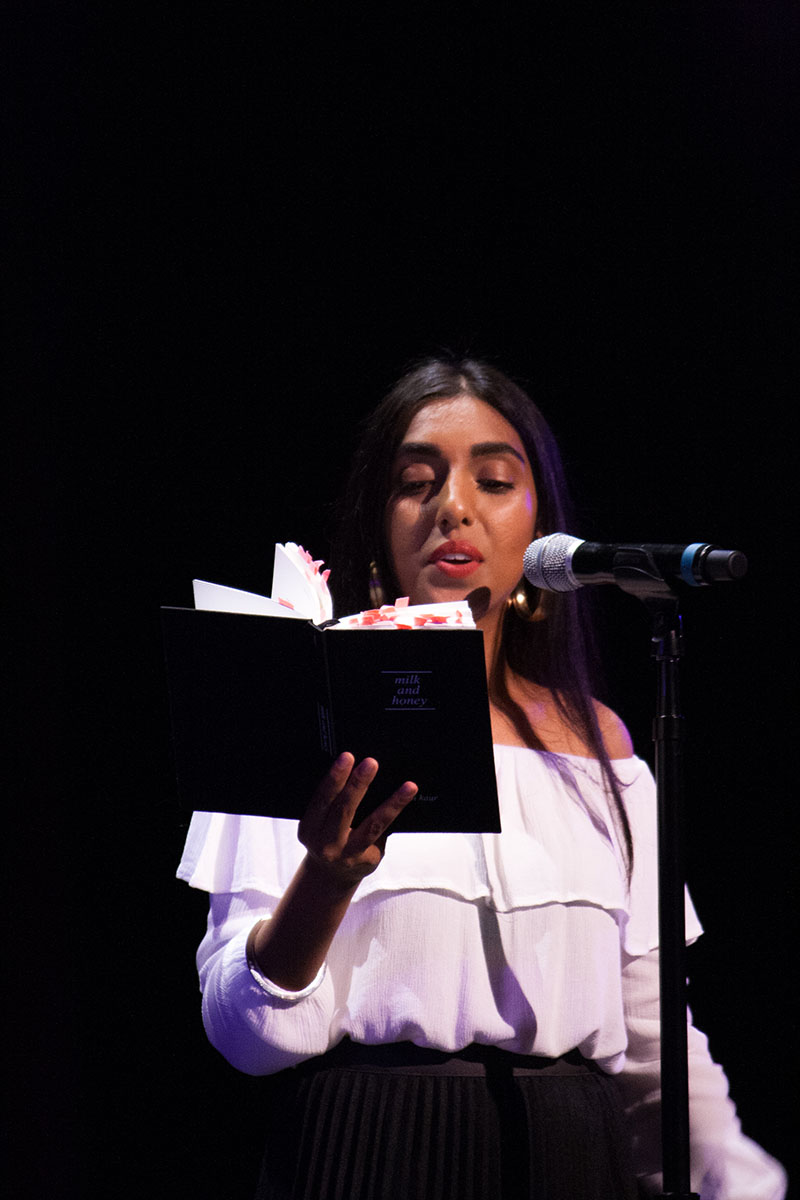Acclaimed poet Rupi Kaur performs for USC students

Sydney Park | Daily Trojan
Milk and honey · Poet Rupi Kaur enchanted audiences with a live reading of her most well-received poems at Bovard Auditorium Thursday night. She ended the night with a book signing after her performance.
At 7 p.m., a long line of students stretched along Trousdale Parkway for a night of snapping, listening, singing and crying with poet and spoken word artist Rupi Kaur.
The event “An Evening With Rupi Kaur,” was a live reading and book signing from Kaur’s New York Times bestselling book Milk and Honey. The event was hosted by the USC Academic Culture Assembly for USC Mental Health Awareness Month, a flagship program that “aims to raise awareness for mental health and fight the stigma associated with mental health.” The evening was also co-sponsored by the USC Women’s Student Assembly.
Kaur came on the stage and started the night with the excitement of teenager, but a wisdom way beyond her 23 years.
“Everyday a new person is becoming inside me, I think this is what growth feels like,” she began, with a soft and slow voice, referring to how detached she felt from the version of herself who wrote Milk and Honey in 2014. “What do you say when the book with your name on it is so beyond your name, how do you reflect on a creation so natural it spilled out of you like blood?”
Kaur answered her own question, “When the poems came like poets, I pulled the words out of me. Like the remains of a gunshot. I had no choice.”
The night was divided into four parts. The first was heavier, focusing on sexual abuse, rape and trauma.
“I am so tired of doing things your way. Sun can’t stop the storm from coming. The tree can’t stop the axe,” Kaur said, in an exasperated tone. “I can’t blame me for having a hole the size of your manhood in my chest anymore. It’s too heavy to carry your guilt, so I’m setting it down.”
The other parts were more lighthearted and geared toward healing and self-love.
“A lot of people always ask me, especially if being South Asian, if it’s always taboo to talk about sex on stage,” Kaur said.
The audience cheered. Kaur mentioned how people don’t know why it’s necessary to say these things. She said it’s necessary because after a traumatic experience there’s survival and love is proof of it.
“It won’t not be love at first sight when we meet, it will be love at first remembrance,” she sighed. “’Cause I have seen you in my mother’s eyes when she tells me to marry the type of man I want to raise my son to be like.” She advised women out there to know what type of man they are looking for and that if he compares other women, he is the wrong person.
“If he can’t help but degrade other women when they’re not looking, if toxicity is central to his language, he could hold you in his lap and be soft,” she said. “Honey, that man could feed you sugar and douse you in rose water but that could still not make him sweet.” The most magical and riveting moment of the night was when Kaur recited her poem “Questions,” with blue lights swirling around like snowflakes and classical music blasting throughout Bovard Auditorium.
Her poems serve as a platform for helpless voices and as a reminder that after destruction, it is possible for one to piece themselves together back again.
Rupi Kaur took her audience on a journey of hurting, loving, breaking and healing. Not only did she charm the audience with her voice, humor and sensitivity, but she also gave an even greater message — the importance of finding sweetness in bitter moments.

Fight the stigma associated with mental health?
No.
Fight the stigmatizers?
Yes.
Lend them credence?
No.
Educate them?
Yes.
Harold A. Maio, retired mental health editor